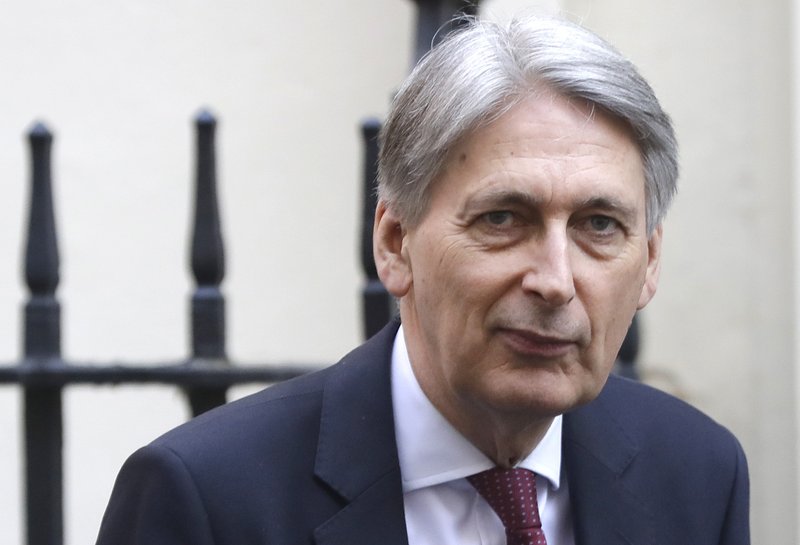LONDON -- The leader of Britain's biggest opposition party on Wednesday urged other opposition forces to unite, topple Prime Minister Boris Johnson's Conservative government and prevent Britain from leaving the European Union in October without a divorce agreement.
The move came after Johnson accused anti-Brexit U.K. politicians of collaborating with the EU to stymie Britain's exit from the bloc.
Jeremy Corbyn, who heads the main opposition Labor Party, said he planned to call a no-confidence vote in Johnson's government "at the earliest opportunity when we can be confident of success" once Parliament returns from its summer break in September.
In a letter to other opposition leaders and pro-EU Conservative lawmakers, the Labor chief said Parliament should then unite behind a Corbyn-led "temporary government" that would seek a delay to Brexit day -- currently scheduled for Oct. 31 -- and call a national election.
The plan is feasible under Parliament's rules, but is likely to face resistance. The smaller opposition parties agree on the need to avoid a no-deal Brexit, but don't want to put Corbyn -- a veteran left-winger whom many distrust -- in power. Labor, meanwhile, is likely to oppose a politician from any other party heading a national unity government.
Johnson has vowed that Britain will leave the EU on Oct. 31 -- just 11 weeks away -- with or without a divorce deal. He is demanding the EU make major changes to the agreement the bloc made with his predecessor, Theresa May. The EU refuses to renegotiate, so a no-deal Brexit appears increasingly likely.
Johnson said Wednesday that there was "a terrible kind of collaboration" between an intransigent EU and U.K. politicians who want to prevent Brexit.
"We need our European friends to compromise, and the more they think there's a chance Brexit can be blocked in Parliament the more adamant they are of sticking to their positon," Johnson said during a question-and-answer session on Facebook.
Philip Hammond, who was Britain's Treasury chief until three weeks ago, accused Johnson on Wednesday of steering the country toward a no-deal Brexit that isn't backed by Parliament or British voters.
Hammond, a Conservative legislator who stepped down as finance minister just before Johnson became prime minister last month, told the BBC that Johnson had moved from a tough negotiating stance to a "wrecking" one by insisting on changes to the withdrawal agreement between Britain and the EU that the bloc would not accept.
Many economists say leaving the EU without an agreement on the terms will trigger a recession and cause economic mayhem, with shortages of fresh food and other goods likely as customs checks snarl Britain's ports.
Johnson and other Brexit supporters argue that any short-term turbulence will be outweighed by new economic opportunities once Britain leaves the 28-nation bloc and can strike trade deals around the world -- notably with the United States. Critics note that the EU accounts for almost half of Britain's trade and any new trade deals are likely years away.
But House Speaker Nancy Pelosi on Wednesday threatened to block any future bilateral trade agreement between the U.S. and the U.K. if Brexit puts at risk the accord that brought an end to the conflict in Northern Ireland.
"If Brexit undermines the Good Friday accord, there will be no chance of a U.S.-U.K. trade agreement passing the Congress," Pelosi said in a statement. "The peace of the Good Friday Agreement is treasured by the American people and will be fiercely defended on a bicameral and bipartisan basis in the United States Congress."
Pelosi's bid to influence Brexit follows remarks in London by President Donald Trump's top national security adviser, John Bolton, who said a bilateral trade agreement would be a top priority for the administration after the U.K. exits the European Union and would get "overwhelming" support in the U.S. Congress.
Though Ireland and the U.K. have promised not to put physical infrastructure on the border in the event of a no-deal Brexit, in reality there will need to be some kind of customs checks at or near what will be the external frontier for the EU's single market.
The removal of checks formed a key part of the commitment to cross-border cooperation in the 1998 Good Friday Agreement, which ended decades of violence particularly in Northern Ireland. Opponents of Brexit argue that any physical infrastructure at the border risks a return to the unrest of the past.
Information for this article was contributed by Jill Lawless and Danica Kirka of The Associated Press; and by Erik Wasson of Bloomberg News.
A Section on 08/15/2019
